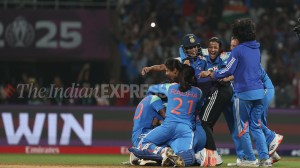When Sharon takes the stage, in the wings will be defence deals
No bilateral defence agreement is going to be signed during Israeli Prime Minister Ariel Sharon’s visit to New Delhi beginning Monday. ...

No bilateral defence agreement is going to be signed during Israeli Prime Minister Ariel Sharon’s visit to New Delhi beginning Monday. But that doesn’t matter. For, in the sidelines of the first ever official visit of an Israeli prime minister, the issue is defence, defence and defence.
Beginning with the billion-dollar Phalcon airborne warning and control systems (AWACS) deal which will be tied up as a follow-up to the memorandum of understanding already signed in April.
|
Our shopping list: |
|
|
Ongoing hardware deals between New Delhi and Israeli companies: |
This deal, which will give Indian fighters air dominance in times of war, involves Russia as well since Moscow will provide three IL (Illyushin)-76 aircraft for installation of the Israeli radar and Indian software for the Phalcon command and control platform.
A date will also be fixed for the signing of the formal tripartite agreement.
With a third of the Sharon delegation comprising big guns—both public and private—the Ministry of Defence is also ready with its shopping list: from avionics for the Indian Air Force’s Jaguars and MiG-27 fighters to thermal imagers and fire-control systems for the Army’s T-72 main battle tanks (see box).
Even though Washington has not yet cleared the sale of Israeli Arrow-2 anti-missile system to India, Tel Aviv has supplied two Green Pine Radars—the heart of Arrow system—in the past two years. The second Green Pine radar, which can pick up signals 500 km away, is understood to have been supplied in the past year.
Besides the big-ticket Phalcon and Green Pine deals, Israeli companies have tied up with Hindustan Aeronautics Limited (HAL) and other Defence PSUs in upgrading the IAF fighters, Army’s tanks and Navy’s anti-missile capability.
Sources said to maintain this tempo and cut the red tape, Uma Pillai, Secretary, Defence Production and Supplies, will lead an Indian Defence PSU delegation to Israel later this year.
Also to be finalised during Sharon’s visit will be the date of the annual Joint Working Group (JWG) meeting on Defence Cooperation. The JWG held its first meeting between September 17-20, 2002 with then Defence Secretary Subir Datta going to Tel Aviv.
New Delhi and Tel Aviv may be downplaying this bilateral defence relationship but India has already conveyed to its Arab friends that just as New Delhi understands their purchasing missiles from North Korea, the purchases from Israel are in the country’s ‘‘national interest.’’
To reinforce this case, they point to Tel Aviv’s track record. At the height of Operation Parakram last June, Israeli Director General Defence Amos Yaron flew to New Delhi following an SOS from the Defence Ministry for urgent defence supplies.



- 01
- 02
- 03
- 04
- 05



























